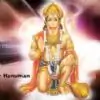When Tulasi went to Kashi and stayed at the house of a pious Brahmin, a keen desire to sing the glory of Rama arose in his heart, but whatever he composed (in Sanskrit verse) during the day he would forget overnight. This went on for several days and Tulasi wondered very much at this strange phenomenon. On the eighth day, however, Siva appeared to him in a dream and said, "Compose in your own spoken language."
These words were still echoing in Tulasi's ears when, on waking, he had a vision of Siva and Parvati. Repeating the words of his dream, Siva said: "Compose your verses in Hindi, my son. Do not get involved in the language of the gods (Sanskrit). You should do that which will be of benefit to all; do not follow the traditional path. Go and live in Ayodhya and let your poetry come to light there. Through the grace of my meritorious deeds, your poetic talent will be fruitful as the hymns of the Sama Veda." Saying this both the divine forms disappeared.
Tulasi marvelled at his own good fortune and left immediately for Ayodhya. This was around the year 1572 AD. While wandering about in the lanes, gardens and woods of the city of Ayodhya, Tulasi met a holy man who in the course of conversation remarked, "I will show you a beautiful spot if you will come with me." Tulasi accompanied him and they came to a secluded place covered with a network of Banyan trees. A seat had been constructed under one of these trees, on which sat an ascetic whose face glowed like fire. He was a realised soul who told Tulasi that his Guru had foretold the coming of Tulasi and had requested him to keep the seat of meditation reserved for Tulasi. The ascetic said "Now my work is done." Then he got up, sat in another place and through the fire of Yoga, burnt his body.
Early in the new Vikram Samvat year of 1631 (March-April of 1574 AD), the position of the planets ( and other astrological signs, not excluding the day of the week, Tuesday, on Rama-Navami day, the birthday of Sri Rama), were exactly as they had been when Rama was born in the distant age of Treta. On this very auspicious day, Hanuman appeared, performed the purification ceremony (abhishek) by the sprinkling of sacred water and chanting of Mantras and installed Tulasi in a new life. Celestial beings such as Siva, Parvati, Ganesha, Saraswati, Narada, Sesa, Surya, Sukracharya and Brihaspati also showered their blessings on him. And then at last Tulasi commenced his writing of the Ramacharitamanasa. He wrote in all for 2 years, 7 months and 26 days, and was able to finish the book on a Tuesday afternoon, on the anniversary of the marriage of Rama and Sita in the month of November-December (Margasirsa) of the Samvat year 1631 (1574 AD). Tulasi was at this time 77 years of age.
The book was first read in the presence of Hanuman who blessed Tulasi, saying, "May your fame spread in the three worlds!"
The next person to hear it was Sri Ruparuna Swami, a holy man of Mithila, who happened to be visiting Ayodhya at that time. He had cultivated the devotional attitude of Janak, regarding Sita and Rama as his daughter and son-in-law. Tulasi held him in high regard and so selected him alone for his first human audience.
Then Dayaludasa, a disciple of Swami Nandalala made a copy for himself and read it to his Guru, presumably in Vrindavan. Later the famous Muslim (Hindi) poet and devotee of Krishna, called Rasakhana heard it.
A few copies of the book had been made by this time. Then through the guidance of the Lord, Tulasi went to Kashi and in the Viswanatha temple recited it to the divine and invisible presence of Siva and Parvati. At night the book was left near the image of Siva and the doors were closed. The ignorant and the learned, ascetics and lovers of God, crowded the temple gate in the morning eager for Darshana (viewing). When at last the temple door opened, to the surprise of every one concerned, "Satyam, Sivam, Sundaram" (the Truth, the Good and the Beautiful) was found written on the Ramacharitamanasa, bearing the signature of Lord Siva Himself. These appreciative words were not only there in black and white, but were heard to echo and re-echo within the temple walls. The spectators, perhaps consisting of the audience of the previous day's recital, were duly impressed.
In this prosaic and down-to earth age of Kali, a miracle had taken place and the news spread like wild fire. The man in the street was beside himself with joy and people rushed to pay their homage to Tulasidas, vying with one another to touch his feet and receive his blessings.
But in this ancient city of Kashi, which had been the seat of Sanskrit learning and a stronghold of orthodoxy from time immemorial, the arrogance of the intellectuals was a force to be reckoned with. They raised a storm of opposition. The Lord's leela (stories about the Lord) should be sung in no other language but the language of the gods (deva-bhasha) or Sanskrit. They exclaimed in pious horror that the great mystery of the Supreme Godhead in the human body (Rama) could not be thus desecrated. The persecution of Tulasidas that followed proved how strongly ingrained was the language prejudice. But befitting his role as a great teacher and in refreshing contrast to the dogmatism of the Pandits (pundits) was the great quality of vision and imagination that Tulasi showed.
The narrowness of heart, stubborn conventionalism and spiritual pride had completely blinded the pandits. Perhaps envy also did not allow them to acknowledge the merits of the book. They were so enraged at its increasing popularity that they decided to get rid of it by shady and unscrupulous means. Two professional thieves called Nidhua and Sidhua were engaged to steal the book. Printing had not been introduced and copies of the Ramacharitamanasa were still rare. In this way the pandits hoped to destroy the work altogether. When the thieves tried to enter Tulasi's hut at night they found two young boys, one of fair and the other of dark complexion, walking up and down with bow and arrow in hand, guarding the entrance of the hut. Observing them thus vigilant the whole night the minds of the thieves were purified.
The next morning they made a confession of their intention to Tulasidas and enquired who were his night watchmen. On hearing the description of what they had seen, Tulasi shed tears of joy and distributed all his possessions to the poor. He congratulated Nidhua and Sidhua on having had a vision of Rama and Lakshmana and they also repented, fell at his feet, and reformed their lives.
Edited by rajnish_here - 17 years ago





























